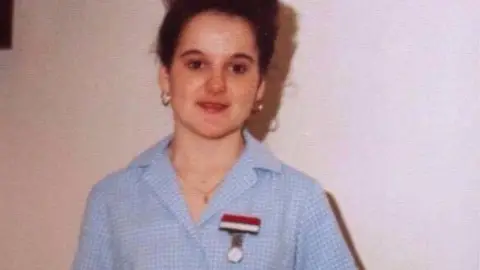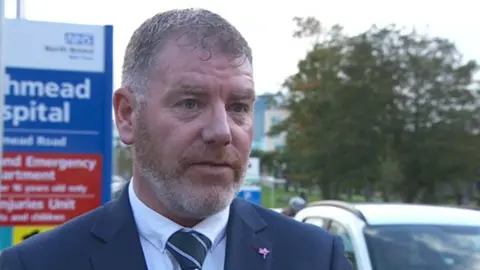Missed cancer diagnosis widower criticises Southmead Hospital report
The husband of a woman who died after repeated failures to diagnose her cervical cancer says he is "convinced there are other victims out there".
Julie O'Connor was given the all-clear by doctors at Southmead Hospital in Bristol more than three years before a private doctor diagnosed her cancer.
An NHS report, seen by the BBC, has concluded there were "errors and failings" in Mrs O'Connor's care.
The trust has said it was "extremely sorry for failing Mrs O'Connor."
Mrs O'Connor had a cervical smear test in September 2014 that came back as negative.
Doctors at Southmead said she had another condition known as a cervical ectropion. She was eventually diagnosed three years later by a private consultant who found a 4.5cm tumour.
Mrs O'Connor and her husband Kevin later sued the hospital for its failings.
 O'Connor family
O'Connor familyAn independent report said there were "serious errors" and a failing by the trust to act urgently when it was discovered Mrs O'Connor did have advanced cervical cancer.
It said staff would "always carry with them the knowledge they could and should have done better".
But Mr O'Connor criticised the report and said it did not cover the full length of his wife's cancer care.
"It doesn't go back to 2014, it doesn't cover the smears, the biopsies and the missed clinical observations," he said.
"We need to consider other victims, look further back, look back to 2014, and make sure we've got a safe and effective screening.
"I am convinced there are other victims out there."

Mr O'Connor added: "There were six opportunities to intervene which they failed.
"We sent them off for analysis to four different university hospitals across the country, [they] all came back that it was unreasonable that any competent pathologist would have not picked this up."
Prof Tim Whittlestone, North Bristol NHS Trust's acting deputy medical director, said the trust was "sorry for causing Mrs O'Connor's family so much pain and suffering".
"We are determined to learn from this and have made significant changes to the way we examine and test for cervical cancer, which I am confident will detect and prevent more cases in future," he said.
"We fully accept the recommendations of the independent review and have been discussing publication dates with Mr O'Connor."
